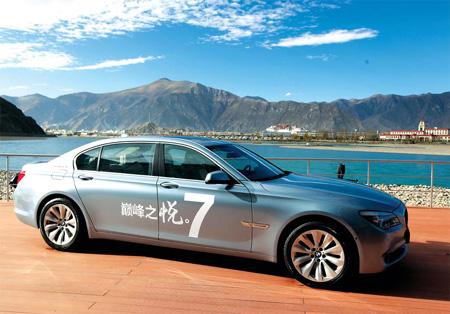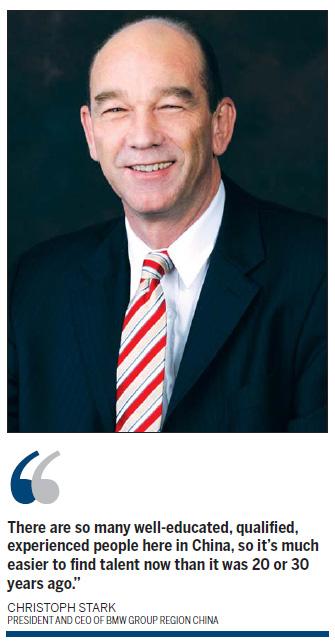
The 7 Series is the flagship model of BMW's lineup in China. [Photo / Provided to China Daily]
Sinophile BMW chief plants 'young tree' that has taken root and is growing well
 BEIJING - Christoph Stark has the same polished appearance as many Western CEOs. But it is when he talks in fluent Chinese - not only everyday speech but also business and even philosophical musings - the 56-year-old German really begins to impress.
BEIJING - Christoph Stark has the same polished appearance as many Western CEOs. But it is when he talks in fluent Chinese - not only everyday speech but also business and even philosophical musings - the 56-year-old German really begins to impress.
In fact, language is just a part of his knowledge about the country. He studied in China in the 1980s, then worked in the country for almost two decades.
In 2004, Stark was appointed president and CEO of BMW Group Region China that includes the Chinese mainland, Hong Kong, Macao and Taiwan. From then on, he has led the Bavarian brand to fast growth - a tenfold surge in annual sales over the past six years.
"If you are in the market, you speak the local language," Stark said.
More localization
He said the BMW's process of localization is organic - first local production facilities, then local suppliers, products, the dealer network and gradually more and more local employees on the management team.
Localization means to understand and adapt to a certain market and cultural environment, Stark said.
"If you want to be really successful, then you must have strong roots in that country."
The first big move Stark made in the Chinese market was to lower prices for the locally produced 3 Series and 5 Series to expand the customer base.
"I still remember very well in January 2005 when we made the announcement," Stark recalled.
At the beginning, many thought the move might harm the BMW brand, but the result was increased sales and a boost to the morale of dealers.
"It was a strategic decision at that time after we found sales of our joint venture products were going this way," Stark said, gesturing downwards.
"This move increased our competitiveness," he said. "We did this only for the 3 and 5 series. And we haven't done it again for six years."
"But that alone would not help. It's just part of a greater story, a bigger strategy," he said.
In 2006, BMW's first long-wheelbase 5 Series hit the market, a model specially designed for Chinese customers who prefer roomy sedans, and it proved to be another correct decision.
Branding campaign
The company's latest and most visible effort in localization is a branding campaign launched in April with "Joy" as the catchword. The theme has been integrated in every product newly launched and every activity targeting either customers or staff.
Stark and his team spent a great deal of time discussing the proper translation of joy in Chinese in order to better convey the message to local customers, a unique effort because BMW uses just the same English word "joy" in most other markets.
"While keeping the same brand position with the same DNA, we need to approach every market from a slightly different angle since people have different cultural backgrounds," Stark said.
And they finally came to the consensus of using yue, a Chinese word that dates back to ancient times and an idea found in works of Confucius.
Stark said yue is a positive notion that means you not only create something joyful for yourself but also for others - it embraces interaction with other people and society.The company also registered the calligraphic form of yue and integrated elements of several Chinese art forms like Beijing opera and ink painting on posters to create a fresh and impressive image of the BMW brand.
It "has worked very well" and "most people understand", Stark said.
The success of the local approach to branding is also a good example of the strength of the whole team, the CEO said.
"You can't do that with one person sitting in a room and who suddenly gets a great idea. These are things you have to find in the process with your partners, your customers, even with people who are critical - you need to have all the opinions, then you come up with the right solution."
"The involvement brings us close together," he said.
Natural result
A majority of managers at BMW's China operation are now locals.
According to Stark, it was a natural result.
"Localization doesn't mean no more overseas managers and experts - you will always have overseas managers and experts, as there will always be some areas where we need them," he said.
"But there are some areas where it is more effective when you have local managers and it's much easier for somebody who's born, raised and educated here to understand what's going on here," he said.
"Also there are so many well-educated, qualified, experienced people here in China, so it's much easier to find talent now than it was 20 or 30 years ago."
Stark said the ratio will continue to go up.
He termed BMW "a young tree" in China, where the automobile market is also very young.
At the time he was appointed chief of the group in 2004, China's commercial vehicle market was bigger than the passenger market. But in 2009, 10.3 million cars were sold in the nation, three times as many vehicles as the commercial market.
"You can't imagine what will happen in the future (in such a young, fast-changing market)", Stark said.
But it is clear the competition will become much fiercer, he said.
"Now the cake is growing and there is more space for everyone," Stark noted. "But the real moment of truth will come when growth is not as huge."
In the first 11 months this year, BMW delivered more than 165,000 cars on the Chinese mainland and in Hong Kong, Macao and Taiwan, a 90 percent surge year-on-year.





